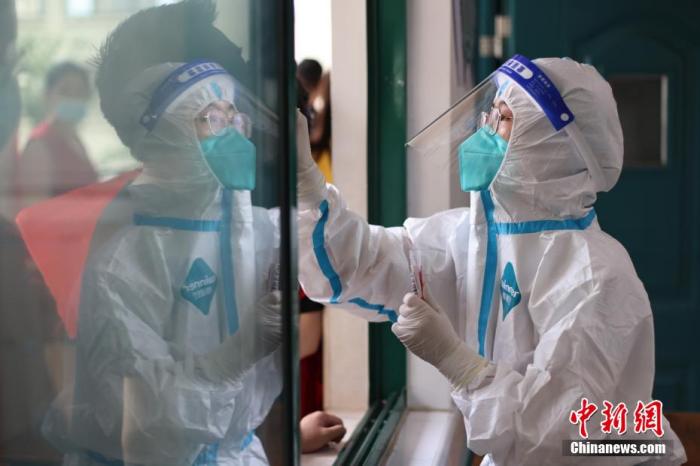(Fighting against New Coronary Pneumonia) Why is the chain of over 100 local cases in Nanjing overflowing rapidly?
China News Agency, Beijing, July 27th (Mar Shuaisha Li Chun) From July 20th to 26th, Nanjing has reported more than 100 local confirmed cases of new coronary pneumonia.
In the past eight days, this round of the epidemic in Nanjing has spread to 5 provinces and 9 cities. Why this round of epidemic has spread so extensively and other issues have attracted attention from all parties.
The early confirmed cases of this round of the epidemic were mainly airport staff.
On July 20, the regular nucleic acid test samples of the staff of Nanjing Lukou International Airport showed positive results.
After testing, 7 confirmed cases and 2 asymptomatic infections were diagnosed. They were mainly security personnel participating in airport flights, including ground service, cleaning and other positions.
Data map: Hospital staff do nucleic acid testing for the public.
Photo by Yang Bo
The epidemic has further spread through social activities and work environment pollution.
As of the 26th, Nanjing has reported a total of 106 local confirmed cases, mainly from Nanjing Lukou Airport cleaning, cabin cleaning staff, ground staff and other staff and related cases.
Currently, Nanjing has 4 high-risk areas and 36 medium-risk areas.
Yu Chuanhua, professor of epidemiology and health statistics at Wuhan University, said in an interview with the media recently that international ports such as airports and cargo terminals are important sources of imported cases of COVID-19 and COVID-19. In addition to human-to-human transmission, many goods and even air are also Can carry the virus and spread to people.
This time, the cabin cleaning of Nanjing Airport was infected. It is not ruled out that you did not wear a mask when cleaning the cabin.
In addition to Nanjing, the current round of epidemic transmission chain has spilled over to 8 cities. Why has it spread so widely in a short period of time?
The particularity of the place where the epidemic occurred may be one of the reasons for the further expansion of the spread.
Shenyang, Liaoning, Dalian, Liaoning, Ma'anshan, Anhui, Wuhu, Guangdong, Zhongshan, Guangdong, Zhuhai, Mianyang, Sichuan, and Siyang County, Suqian, Jiangsu, etc., have successively detected local infections with a history of living in Nanjing, including many cases I have been to Nanjing Lukou Airport recently.
In an interview with the media recently, academician Zhang Boli of the Chinese Academy of Engineering reminded that as the overseas epidemic is still serious, the airport as a transportation hub, especially the large airport carrying overseas flights, needs to be extra vigilant.
Another reason may be the virus itself.
According to official reports, judging from the cases that have completed genetic sequencing, the new coronavirus strain that caused the epidemic is the Delta strain.
Judging from the previous related epidemics, the strain has increased adaptability to the body, spread faster, has a higher viral load, and has a longer treatment time, making it easier to develop into severe illness.
This is not the first time that Mainland China has fought against Delta.
From May to July this year, the Delta mutant strain caused epidemics in Guangzhou, Shenzhen, Dongguan and other places. During the outbreak in Ruili, Yunnan, the sequencing results of 7 positive samples also showed that the genome sequence of the Delta mutant strain was highly homologous.
Yang Yi, an expert in the treatment of new coronary pneumonia and director of the Department of Critical Care Medicine at Zhongda Hospital affiliated to Southeast University, revealed in an interview with the media on the 22nd that most of the confirmed cases in this round of the epidemic in Nanjing had been vaccinated.
Related reports have caused concern.
Shao Yiming, a researcher at the Chinese Center for Disease Control and Prevention, introduced this at an official press conference in May this year.
He said that the protective role of vaccines is divided into three levels: primary protection is to prevent infection, secondary protection is to prevent disease, reduce the severity of the disease and avoid death, and tertiary protection is to prevent the virus from spreading to others.
"The first level is to prevent infection, the second level is to prevent disease, and the third level is to prevent transmission."
Many experts have pointed out on different occasions that infection after vaccination does not mean that the vaccine has failed.
Regarding the outbreak in Nanjing this time, Yang Yi also said that the vaccinated cases have generally mild symptoms, and the probability of turning into a severe case is significantly lower, and the course of the disease is relatively short.
This also shows that vaccination still has a protective effect.
Zhong Nanshan, an academician of the Chinese Academy of Engineering, pointed out in late June this year that in response to the Delta strain, the concept of close contacts must be changed. Currently, the commonly used domestic vaccines are still effective against the Delta mutant strain and people should be vaccinated.
Zhang Boli also recently emphasized again that it is necessary to actively promote and vaccinate.
After being vaccinated, even if infected, it is mild and will not turn to severe, and it has a protective effect on the patient.
(Finish)

